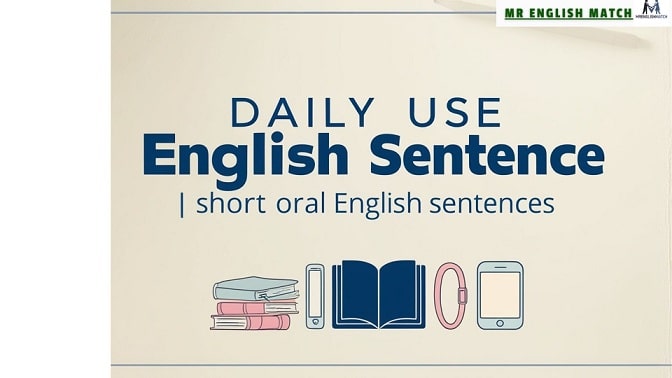Mastering daily use English sentences can feel like an uphill climb, but with the right practice, it quickly becomes second nature. From greetings to essential expressions, knowing 1000 English sentences used in daily life equips you for any situation—whether it’s meeting someone with a polite “Nice to meet you” or asking a simple “What’s your name?”. These short English sentences create the foundation of real conversations, making language learning approachable and fun. Imagine walking into a new place and confidently asking, “Where are you from?” or sharing a lighthearted “Let’s go outside” to connect. Each phrase makes your English flow and opens doors.
Even during those everyday moments, sentences that challenge your English keep it engaging. Phrases like “How’s the work?” or “I’m hungry” are not just casual—they reflect common needs and desires in daily interactions. Maybe you’ll ask, “How old are you?” in conversation or say “Take care” when bidding farewell. Learning these expressions helps with the practical use of English in real life. And if you ever need assistance, a friendly “I need help” will never fail. From “See you soon” to deeper chats, these tools empower you to speak confidently every day!
what is a sentence ?
A sentence is a group of words that conveys a complete thought, often with a subject and a predicate. It can express a statement, a question, an exclamation, or a command. Short English sentences like “What’s your name?” or “I’m hungry” are common in daily interactions and illustrate how sentences can range from simple to complex. Structuring clear, meaningful sentences is essential for effective communication, whether through daily use English sentences or more formal expressions. Sentences can be descriptive, as in “Where are you from?” or directive, like “Take care,” showing their wide range and importance in language learning.
daily use English sentences
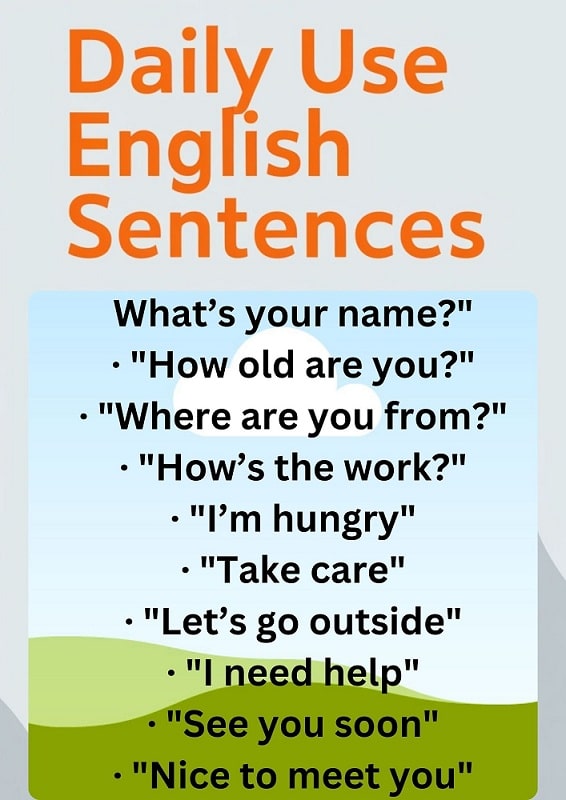
Here’s the table of sentences sorted alphabetically, including an emoji for each entry. This table is mobile-friendly, with two columns.
| Sentence | Emoji |
|---|---|
| Bring it. | 📦 |
| Come quickly. | 🏃♂️ |
| Don’t take it. | 🚫 |
| I brush my teeth. | 🪥 |
| I came. | 🏠 |
| I go to school. | 🎒 |
| I have breakfast. | 🍽️ |
| I take a shower. | 🚿 |
| I wake up at 6 AM. | ⏰ |
| I went. | 🏃♀️ |
| I’m feeling sleepy. | 😴 |
| Make an effort. | 💪 |
| Never say die! | 💪 |
| Nobody is speaking. | 🤐 |
| Now go to bed. | 🛏️ |
| Now try again. | 🔄 |
| Once was enough. | ☝️ |
| Read this. | 📖 |
| She goes. | 🚶♀️ |
| Talk to you later. | 👋 |
| Thanks so much! | 🙏 |
| Time is up. | ⏱️ |
| Walk slowly. | 🚶♂️ |
| Watch out! | ⚠️ |
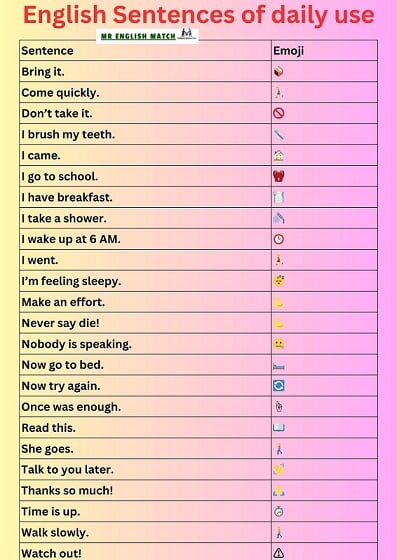
daily use English sentences
Here’s your alphabetically ordered table of sentences with corresponding emojis, in a mobile-friendly format:
| Sentence | Emoji |
|---|---|
| Can you help me? | 🙋♂️ |
| Can you repeat that? | 🔁 |
| Do you have a car? | 🚗 |
| Everything is fine. | 😊 |
| How dare you? | 😠 |
| How much does it cost? | 💰 |
| How much is this? | 🏷️ |
| How old are you? | 🎂 |
| I am 20 years old. | 🎉 |
| I am an English Instructor. | 📚 |
| I am on the way. | 🚶♂️ |
| I don’t know. | 🤷♂️ |
| I don’t understand. | ❓ |
| I got hurt. | 🤕 |
| I’m from Lahore. | 🕌 |
| It’s okay. | 👍 |
| Let me see. | 👀 |
| Look again. | 🔍 |
| Look at this. | 👆 |
| Move forward. | ⏩ |
| Pull him. | 🤝 |
| Spit out. | 🗣️ |
| Wait a moment. | ⏳ |
| What do you do? | 💼 |
| What time is it? | ⏰ |
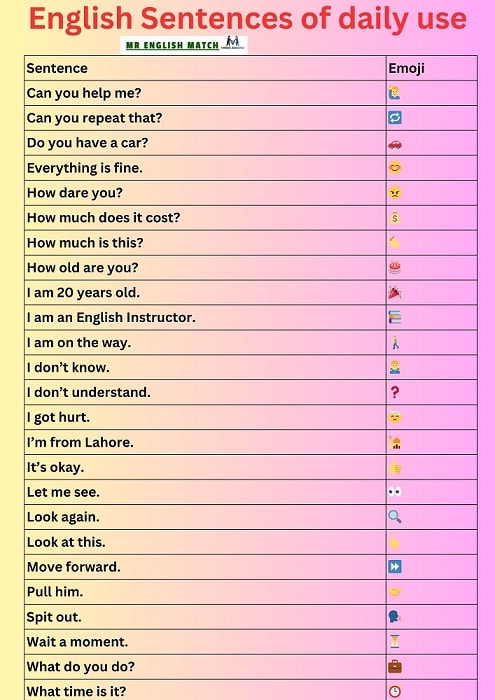
daily use English sentences
Here’s your requested table with the given sentences arranged alphabetically and paired with emojis, in a mobile-friendly format:
| Sentence | Emoji |
|---|---|
| Allow me. | 🙇♂️ |
| Call him. | 📞 |
| Come quickly. | 🏃♂️ |
| Don’t Abuse. | 🚫 |
| Don’t worry. | 😊 |
| Focus Here. | 🎯 |
| Good one. | 👍 |
| How old are you? | 🎂 |
| I have to go. | 🚶♂️ |
| I don’t believe. | 🤯 |
| I wish. | 🌠 |
| It’s a lovely day. | ☀️ |
| Let’s play. | 🎮 |
| Look at me! | 👀 |
| May I go to toilet? | 🚽 |
| Not the least! | 🚫 |
| On The Spot. | 📍 |
| Talk to you later. | 👋 |
| Thanks so much! | 🙏 |
| This is not fair. | 😤 |
| Try your luck. | 🎲 |
| Walk slowly. | 🚶 |
| What’s up? | 👋 |
| Where is your office? | 🏢 |
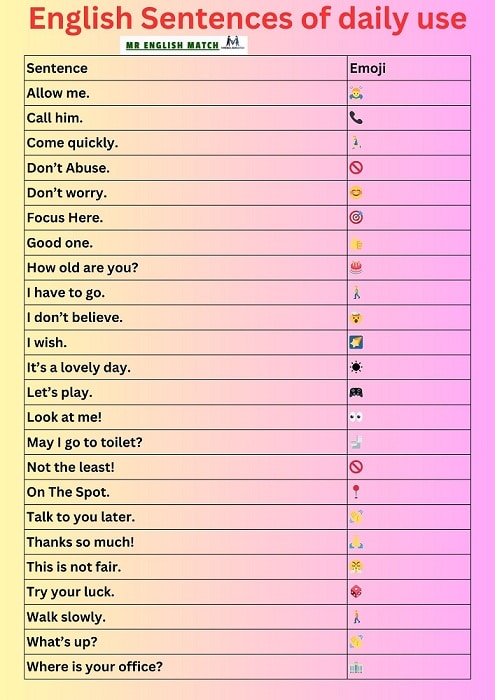
daily use English sentences
Here’s the alphabetically ordered table with the sentences and emojis, formatted for mobile view:
| Sentence | Emoji |
|---|---|
| Be quiet. | 🤫 |
| Don’t be late. | ⏰ |
| Have fun. | 🎉 |
| How old are you? | 🎂 |
| How’s the work? | 🏢 |
| I am on my way. | 🚶♂️ |
| I am so tired. | 😫 |
| I miss you. | 💌 |
| I need help. | 🙋♀️ |
| I’m bored. | 😐 |
| I’m hungry. | 🍔 |
| I’m thirsty. | 🥤 |
| Let’s go outside. | 🌳 |
| My name is Amenda. | 👩 |
| Nice to meet you. | 🤝 |
| See you soon. | 👋 |
| Take care. | ❤️ |
| That’s great. | 👍 |
| That’s too bad. | 😔 |
| This is not fair. | 😤 |
| What happened? | 🤔 |
| What’s your name? | 📝 |
| Where are you from? | 🌍 |
| Where is your office? | 🏢 |
You might like also:
Excel or Accel: What is the Correct Spelling?
Hoodie or Hoody? Choosing the Right Spelling
Compound Words Starting with P
FAQs
What are daily use English sentences?
Daily use English sentences are common phrases or expressions used in everyday interactions. They help communicate effectively in casual conversations, work settings, travel, and other routine situations. Examples include greetings, questions, requests, and everyday remarks like “What’s your name?” or “How’s the work?”
Why should I learn 1000 English sentences used in daily life?
Learning 1000 English sentences used in daily life provides a strong foundation for speaking and understanding English. These phrases cover a broad range of everyday interactions, making it easier to express yourself fluently, connect with others, and respond confidently in different scenarios.
What are some short English sentences for beginners?
Short English sentences for beginners are easy-to-understand phrases that facilitate basic communication. Examples include “I’m hungry,” “Take care,” “Let’s go outside,” and “See you soon.” They are simple yet essential for building fluency and forming quick responses in conversations.
How can daily use English sentences improve my communication skills?
Daily use English sentences enhance your ability to speak confidently in different situations by teaching you practical, conversational language. They make it easier to connect with others, express needs, and respond appropriately, which builds your overall confidence and comprehension.
Where can I practice sentences that challenge your English?
You can practice sentences that challenge your English by engaging in conversations with native speakers, joining language classes, using language apps, and immersing yourself in English media such as movies, podcasts, and books. This practice sharpens your skills and builds a strong grasp of English nuances.
What’s the importance of using questions like “What’s your name?” in conversations?
Questions like “What’s your name?” are essential for initiating interactions, building relationships, and showing interest in others. These types of questions are fundamental in establishing rapport, making introductions, and communicating effectively in both formal and informal settings.
Can short English sentences be used in professional settings?
Yes, short English sentences can be used effectively in professional settings. For instance, phrases like “How’s the work?” or “I need help” are appropriate in work environments. They convey clear messages concisely, ensuring effective communication without sounding too formal or complex.
How do I incorporate daily use English sentences into my routine?
To incorporate daily use English sentences into your routine, practice speaking them during conversations, role-playing situations, and repeating them while reading or watching English content. Consistent use of phrases like “Where are you from?” and “See you soon” will make them a natural part of your speech.
What are common examples of daily use English sentences for greetings?
Common examples of daily use English sentences for greetings include “Nice to meet you,” “How’s it going?” and “See you soon.” These phrases help break the ice, start conversations smoothly, and create positive first impressions during introductions.
Are daily use English sentences helpful for travelers?
Yes, daily use English sentences are extremely helpful for travelers. Basic phrases like “I’m hungry,” “Where are you from?” or “I need help” assist with navigating new places, making requests, and communicating with locals effectively, making travel experiences more enjoyable and less stressful.
conclusion
Mastering daily use English sentences is your gateway to confident and effective communication. Whether it’s a simple “What’s your name?” to make new friends or “I need help” in a tricky spot, these everyday phrases bring English to life. With consistent practice, you’ll find yourself speaking fluently, building connections, and expressing your thoughts effortlessly. So, embrace these words, keep learning, and let your conversations shine. Happy speaking!
Sources:

John Robert is a seasoned grammar enthusiast and the insightful voice behind MrEnglishMatch. With years of experience in language arts and a passion for clear, effective communication, John’s blog posts blend expertise with approachable advice. His deep understanding of grammar and style helps readers sharpen their writing skills and master the nuances of English. When not blogging, John enjoys exploring new languages and reading classic literature.

